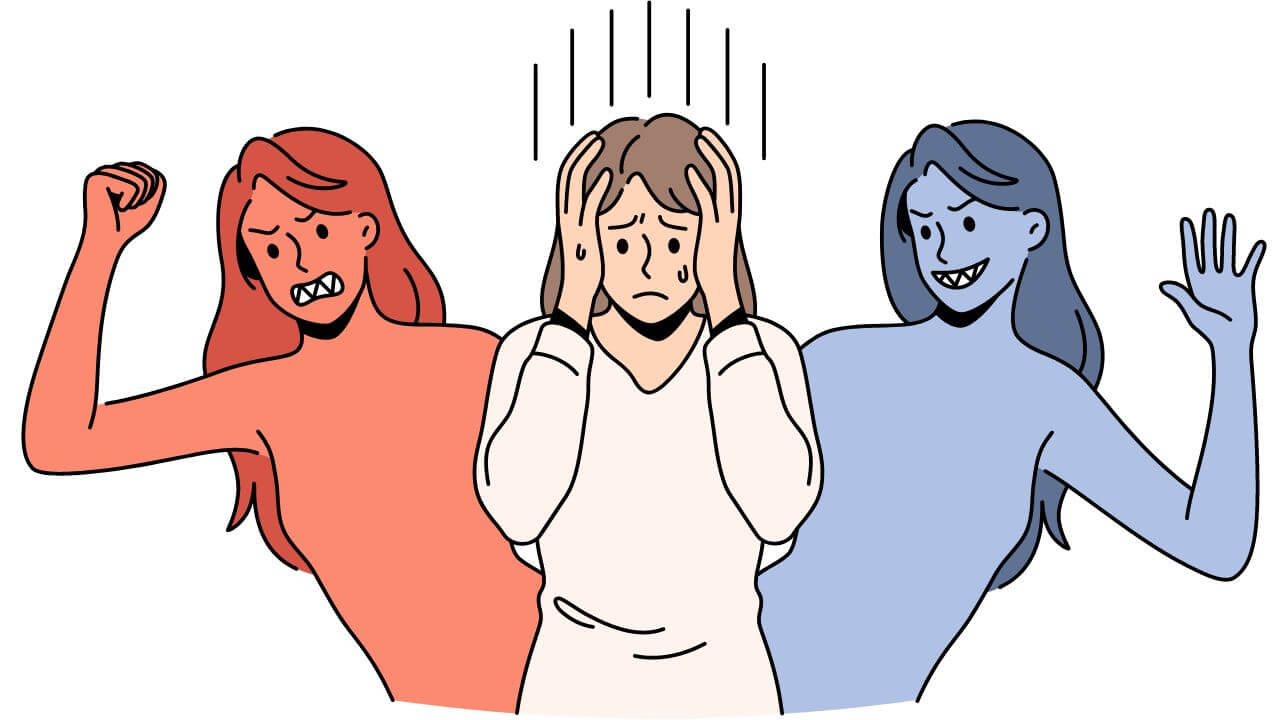Does Tough Love Work with Bipolar Disorder? An Evidence-Based Analysis
For families and partners navigating the turbulent waters of bipolar disorder, the emotional journey can be overwhelming. In moments of desperation, frustration, or fear, the phrase ‘tough love’ often surfaces as a potential solution. It’s a concept rooted in the idea that a firm, uncompromising stance will force a loved one to confront their illness and take responsibility. But in the landscape of clinical psychology and lived experience, does this approach actually help, or could it cause significant harm?
This article, guided by our mission at go4healthnfitness.com to deliver wellness insights grounded in scientific truth, unpacks the evidence. We will explore the complexities of tough love in mental health, analyze the neurobiological nature of bipolar disorder, and present expert-backed, compassionate alternatives. The goal is not to judge but to illuminate the most effective path toward stability, healing, and stronger family strategies for bipolar wellness.
Key Takeaways
- “Tough Love” is Largely Ineffective: Most mental health experts agree that punitive or shaming “tough love” tactics are harmful and counterproductive for managing bipolar disorder, a complex neurobiological illness.
- Focus on Support, Not Punishment: Bipolar disorder is not a choice or a moral failing. Effective bipolar disorder support involves compassion, structured routines, and collaborative problem-solving, not ultimatums.
- Boundaries are Crucial but Different: Setting healthy boundaries is essential for the well-being of everyone involved. However, boundaries are about safety and respect, not punishment. They are protective, not punitive.
- Communication is Key: Evidence-based communication with bipolar loved ones focuses on validation, “I” statements, and de-escalation. This fosters trust and encourages treatment adherence.
- Avoid Enabling, Aim for Empowering: The true alternative to tough love isn’t enabling destructive behavior. It’s empowering your loved one by supporting their treatment, encouraging their autonomy, and holding them accountable within a compassionate framework.
The “Tough Love” Dilemma 🧠
The term tough love itself can be a source of confusion. What one person considers a firm boundary, another might see as a painful punishment. Understanding this distinction is the first step in managing bipolar relationships effectively.
Defining “Tough Love” in a Relational Context
In the context of mental illness, tough love typically refers to actions such as:
- Issuing ultimatums (e.g., “Get help or get out”).
- Withdrawing emotional or financial support as a consequence of symptoms.
- Refusing to engage with a loved one during a mood episode.
- Using shame or guilt to try and motivate change.
These actions often stem from a place of deep pain and exhaustion. Caregivers may feel they have tried everything else and believe a drastic measure is the only option left. While the intention might be to provoke a “rock bottom” moment, this concept is highly problematic when applied to a medical condition like bipolar disorder.
A Clinical Overview of Bipolar Disorder
To understand why tough love fails, we must first understand the illness itself. Bipolar disorder is a serious mental illness characterized by extreme shifts in mood, energy, and activity levels. It’s not simply “moodiness”; it’s a disruption of brain chemistry and function.
The primary states of bipolar disorder include:
- Manic Episodes: Periods of abnormally elevated, expansive, or irritable mood, accompanied by increased energy. Symptoms can include racing thoughts, decreased need for sleep, grandiosity, and impulsive, often risky, behavior.
- Hypomanic Episodes: A less severe form of mania that doesn’t include psychotic features and may not cause major impairment in social or occupational functioning. However, it is a clear change from the person’s usual state.
- Depressive Episodes: Periods of intense sadness, hopelessness, and loss of interest or pleasure. Symptoms include fatigue, changes in sleep or appetite, feelings of worthlessness, and suicidal ideation.
Crucially, the National Institute of Mental Health (NIMH) emphasizes that bipolar disorder is a lifelong illness with a biological basis. The behaviors seen during mood episodes are symptoms of a dysfunctional brain state, not calculated choices.
The Clinical Verdict on Tough Love ⚖️
When you view bipolar disorder through a medical lens, applying punitive measures becomes logically and ethically questionable. You wouldn’t use “tough love” on someone having a seizure or a diabetic crisis. The same principle applies here.
The Psychological Argument Against a Punitive Approach
The core issue with tough love is that it introduces intense stress, shame, and instability into the life of someone whose brain is already struggling to maintain equilibrium.
“For a person with bipolar disorder, the experience of having their support system become a source of stress and punishment can be catastrophic,” states Dr. Eleanor Vincent, a psychiatrist specializing in mood disorders. “It can trigger more severe and frequent episodes, deepen depression, and obliterate the trust necessary for a therapeutic alliance. In essence, it adds fuel to the fire.”
This aligns with the diathesis-stress model in psychology, which posits that individuals with a biological predisposition for a disorder (diathesis) are more likely to develop it when exposed to stress. For someone already diagnosed, high-conflict environments and emotional distress are significant triggers for relapse.
Risks and Potential Harms of Tough Love ⚠️
A punitive approach, far from helping, poses severe risks:
- Increased Suicide Risk: Bipolar disorder already carries a high risk of suicide. Feelings of rejection and hopelessness can exacerbate suicidal ideation.
- Treatment Avoidance: If a person feels judged or shamed, they are less likely to seek or comply with bipolar disorder treatment approaches like therapy and medication.
- Damaged Relationships: Trust is the bedrock of a supportive relationship. Tough love erodes it, often irreparably, leading to isolation when the person needs connection most.
- Worsening Symptoms: Stress is a well-documented trigger for both mania and depression. A punitive environment is a high-stress environment.
- Substance Use: People may turn to drugs or alcohol to cope with the emotional pain of both their illness and the rejection from their family.
Building a Healthier Path Forward: Support and Empowerment 🤝
Rejecting tough love does not mean accepting chaos or enabling destructive behavior. The alternative is a structured, evidence-based approach centered on compassion, communication, and clear boundaries. This is the fine line between enabling vs supporting.
From Enabling to Empowering: A Comparative Guide
It’s a common fear: “If I’m not tough, won’t I just be enabling them?” This is a false dichotomy. The goal is empowerment, which is distinct from both punishment and enabling.
| Tough Love Tactic (Punitive) | Enabling Behavior (Permissive) | Supportive Boundary (Empowering) |
|---|---|---|
| “You’re acting crazy. I’m not talking to you until you’re normal.” | Pretending the erratic behavior isn’t happening to avoid conflict. | “I can see you’re struggling right now. Your words are hurting me, so I’m going to step away. We can talk later when we’re both calm.” |
| Refusing to help pay for medication because “you need to learn responsibility.” | Giving them money indiscriminately, which might be used for impulsive purchases during mania. | “I am committed to your health. I will help you create a budget for your medication and drive you to the pharmacy to pick it up.” |
| Kicking them out of the house during an episode with no plan. | Making excuses to others for harmful behavior (e.g., DUIs, job loss). | “Your safety is my priority. We created a crisis plan with your doctor, and it says we need to contact them now. I will not lie to protect the illness.” |
Evidence-Based Alternatives: Supportive Communication and Boundaries
Effective family strategies for bipolar management are skills that can be learned. They focus on creating a stable and predictable environment.
1. Practice Compassionate Communication: 🗣️
- Use “I” Statements: Instead of “You are being irrational,” try “I am feeling scared by your behavior.”
- Validate their Feeling, Not the Behavior: You can say, “It sounds like you feel incredibly angry right now,” without agreeing with a destructive action. This shows you are listening.
- Listen Actively: Put away distractions and truly hear their experience. Sometimes, feeling heard is a powerful de-escalator.
2. Establish Clear and Consistent Boundaries: 🛡️
- Boundaries are rules of engagement that protect everyone’s well-being.
- They should be decided upon during a period of stability, not in the heat of an argument.
- Example: “I love you unconditionally, but I cannot allow yelling in our home. If the volume rises, I will leave the room.”
3. Create a Collaborative Crisis Plan: 📝
- Work with your loved one and their healthcare provider during a baseline mood state.
- Outline symptoms that indicate an emerging episode.
- List contact information for their doctor, therapist, and trusted allies.
- Agree on action steps (e.g., “If I have not slept for two nights, I agree to let you call my psychiatrist.”).
4. Encourage Treatment Adherence: 💊
- Frame medication and therapy as tools for stability, not punishments.
- Offer practical help, like providing transportation to appointments or helping with medication reminders.
5. Prioritize Your Own Self-Care: ❤️
- Caregiver burnout is a significant risk. You cannot pour from an empty cup.
- Seek your own therapist or join a support group like those offered by the National Alliance on Mental Illness (NAMI). This is not selfish; it’s essential for sustained support.
Conclusion
The impulse behind “tough love” often comes from a place of love, but it is a love that has been distorted by fear, frustration, and a deep misunderstanding of bipolar disorder. The overwhelming consensus from clinical experts and research is that this punitive approach is not only ineffective but deeply harmful. It undermines the very foundation of trust and safety that is essential for recovery.
The more courageous, effective, and truly loving path lies in structured support. It requires education, patience, and the willingness to learn new skills for communication with bipolar loved ones. By setting firm, respectful boundaries, fostering open dialogue, and working collaboratively with healthcare professionals, families can move beyond the destructive cycle of enabling vs supporting and create an environment where their loved one has the best possible chance to thrive.
Frequently Asked Questions (FAQ)
1. Isn’t setting boundaries a form of tough love? No. The core difference is intent. Tough love aims to punish or force change through suffering. A healthy boundary aims to protect everyone’s safety and well-being. It’s a rule of engagement, not a weapon. For example, “I will not give you money if you are using drugs” is a boundary to protect both of you; refusing to speak to them for a month is a punishment.
2. What can I do if my loved one refuses treatment? This is an incredibly difficult situation. You cannot force an adult into treatment against their will unless they are an immediate danger to themselves or others. Focus on what you can control: your own actions and boundaries. You can say, “I am very worried about you, and I strongly encourage you to see your doctor. I can no longer, however, absorb the financial or emotional consequences of untreated mania.” Continue to express love and concern while protecting your own stability.
3. How can I support them without burning out? Self-care is non-negotiable. Join a support group (in-person or online) for families of people with bipolar disorder. See your own therapist to process your feelings. Schedule time for your own hobbies and friendships. Setting boundaries about what you are and are not willing to do is also a key part of preventing burnout.
4. My loved one says hurtful things during an episode. How do I not take it personally? It is incredibly difficult, but try to remember the mantra: “It’s the illness talking, not the person.” This doesn’t make the words less painful, but it can help you depersonalize them. It is also perfectly acceptable and healthy to state a boundary: “When you speak to me that way, I feel hurt, and I need to end this conversation. We can try again later.”
References
- National Institute of Mental Health (NIMH). (2023). Bipolar Disorder. https://www.nimh.nih.gov/health/topics/bipolar-disorder
- Miklowitz, D. J. (2011). The Bipolar Disorder Survival Guide, Second Edition: What You and Your Family Need to Know. The Guilford Press.
- Perry, A., Tarrier, N., Morriss, R., McCarthy, E., & Limb, K. (1999). Randomised controlled trial of efficacy of teaching patients with bipolar disorder to identify early symptoms of relapse and obtain treatment. BMJ (Clinical research ed.), 318(7177), 149–153.
- Reinares, M., Colom, F., Sánchez-Moreno, J., et al. (2008). Impact of a psychoeducational family intervention on caregivers of bipolar I patients. Psychiatric Services, 59(1), 1-7.
- National Alliance on Mental Illness (NAMI). Family Members and Caregivers. https://www.nami.org/Your-Journey/Family-Members-and-Caregivers




